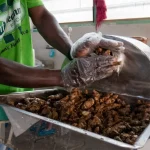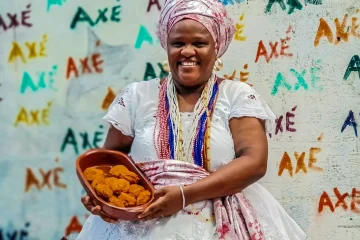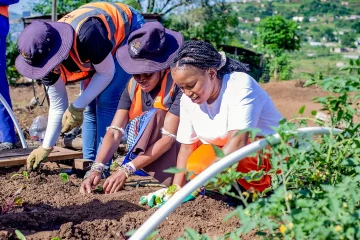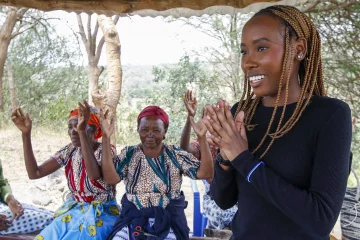FOR years, Charity Adupong’s shopping experiences were marked with disappointment as she searched for nutritious local foods in major shopping malls and retail stores. The few that were on the shelves lacked attractive packaging.
Increasingly she realised that a huge opportunity existed in providing shoppers with well-packaged indigenous foods. She decided to tap into the growing demand.
“I didn’t like the way our markets are structured. We openly display food with flies flying all over. And then there is the one on the floor, the ones that are stored later aftermarket and just stored anyhow. So I wanted to do something about it,” Adupong explained, as she moved around one of three different factory facilities she now runs.
Only in her early 20s at the time and part of a family supported by a single mother, Adupong took matters into her own hands.
After getting the green light from ShopRite to supply them with her products, she started raising funds by saving. She proceeded to register her business and moved to certify her products with the Ghana Standards Authority, Food Research Institute and the Food and Drugs Authority where she also received training and capacity building.
With just 15 cedis (about US$1.2) to her name, she rented a shop.
Luckily, Adupong had some experience in business before she started what today is Meannan Foods. She had started out buying and selling second-hand clothes and anything she could lay her hands on. She wanted to attend fashion school but that dream was truncated due to the cost.
She has over the years invested in state-of-the-art machines and technology in every step of the company’s production to ensure world-standard packaging that can compete with imported products.
As she moves around her factory inspecting dried cassava chips spread on racks and neatly covered with blue nets it is clear that her sense of aesthetic extends beyond the packaging on her product labels.
“Having our processing plant close to our farmers helps us to be able to process them in time to get the best quality out of it, and also add on to the shelf life so that in the lean season there is still food,” Adupong said.
Currently with 33 employees, the company’s strategic location in Afienya-Mataheko of the Ningo-Prampram District of the Greater Accra Region helps in sourcing raw materials from different parts of the country for timely deliveries.
“We are supporting our small community by giving jobs to people and when I came here first we didn’t have light (power). I had to bring light. I had to bring water, being an entrepreneur in Ghana is also being like a government, and also a contractor, whatever you can call yourself,” Adupong said.
The name “Meannan” came from Adupong’s indigenous name and maiden surname and the company has become known for the face-lifts it has given to Ghanaian indigenous foods. The facilities are located in Afienya-Mataheko near Tema in the Ningo-Prampram District of the Greater Accra Region.
From her first small steps, CEO and Founder “Maame Ekua Annan” started seeing real growth after winning a grant in 2015, on top of previous loans from the bank. The win coincided with Adupong quitting her job to focus on Meannan Foods full-time.
Adupong believes the bigger picture for entrepreneurs in the food processing sector lies right in Ghana, especially being a rapidly growing middle-income country experiencing diet changes.
Meannan Foods’ range of products extends from cassava powder, prekese (aidan fruit) powder, ginger powder, Gari, and onion powder to corn grits, with the biggest seller being Tombrown – a cereal-based porridge with high protein content and affordable.
“The biggest challenge of a business like mine is sourcing the right raw materials. There is this thing we say, ‘garbage in, garbage out’, so what you put in is what will come out. In sourcing it is very difficult to get the quality that we need,” she further explained.
Quitting her job to focus on Meannan Foods has paid off for Adupong. She has since also won several local and international awards, including the Global Women Innovators “for the work done with our porridges on fighting malnutrition in children.
Adupong wants Meannan to become a household name and for local foods to be just as attractive as imported food on shelves.
Her products are currently found in different branches of ShopRite, Melcom and other retail shops in and out of the Greater Accra Region.
“Products like prekese, dawadawa powder, if you see how they’re done, you may not want to eat them…, but now they come in very nice packaging and we have improved it a lot…” she said.
Ghanaian food packing and quality experts interviewed by bird story agency believe identifying entrepreneurs like Adupong with innovative ideas to equip them with tools and networks can help to overcome barriers to growth and improve competitiveness, leading to increases in local food packaging and job creation.
Emelia Dodoo is a supervisor at the Marina Mall Supermarket in Accra. She stocks Meannan products, but a good number of them are imported due to the preferences of her customers.
“I think it is very important for locally made products to be given a facelift in terms of branding quality of their product to attract people from all walks of life, even those in the diaspora. And then to attract malls like Marina to restock their products and then take their brands in Ghana internationally. And so we have a brand like Meannan who we have been restocking their products for close to five years now because of the quality of their products and the packaging as well,” Dodoo said.
Being a mother and woman whose journey was diverted due to financial struggles, gender played a role in the success of her food business.
“I didn’t think that I would be here at this point in time, but by just starting and keeping at it and going on and on, this is where I am now,” she said.
For Adupong, an increase in demand for locally packaged foods translates to real-time growth in the economy, job creation and the path to economic freedom for families.














